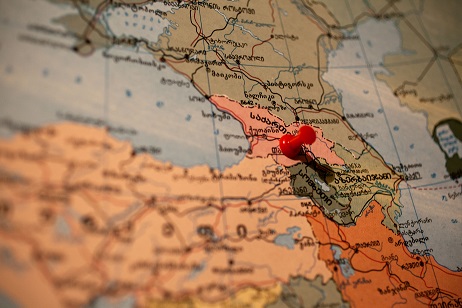Georgia: EU-associated nation and key player of international transits

Georgia’s state-operated railway company will ensure the Caucasus is connected with Europe and Scandinavia, Prime Minister Giorgi Kvirikashvili says.
Kvirikashvili spoke about Georgia’s role as a transit country and its participation in several international transport corridors in his interview with international journal Caspian Energy.
The PM explained why Georgia’s participation in the Viking train project was important for strengthening the transit function of the country and the formation of a logistical hub in the region.
The Viking container train was an international initiative spanning from Lithuania through Belarus, Ukraine, Romania, Moldova, Bulgaria and Turkey that connected the Baltic and Black Seas via railway. Georgia signed papers about joining the project in 2011.
Kvirikashvili named several advantages of this particular project. These included:
- Its intermodal nature;
- Fixed schedule that allowed for interoperation with other modes of transport;
- Competitive cost compared to alternative modes of transport;
- The minimum time required for paperwork and customs clearance procedures at the border; and
- The minimum delay for delivery of goods to their destinations.
Georgian Railway became a full member of the Viking project in April 2015, with the Bulgarian Navy and the Finland-based company Containerships as associate members, and Gefco Company and Steveco Logistics as new operators through Turkey, Sweden and Finland.
"Joining JSC with Georgian Railway will ensure that the Caucasus is connected with Europe and Scandinavia as well as improve the conditions of mutual transit of goods between the participating countries of the TRACECA program and in the East-West, North-South directions,” the PM said.
"It will also create alternative transportation routes for trade between Europe and Asia.”
Kvirikashvili also talked about the New Silk Road project and said it was crucial to ensure that transportation of additional cargo flows from China to Europe can go through Georgia without any obstacles.
"There is a huge potential for Georgia to capture significant volumes from various alternative routes,” he said.
"The current situation in the region, with various Silk Road initiatives aiming to promote trade, economic cooperation and development, is very promising.”
The Georgian leader noted during 2015 and in early 2016 railway freight transportations from China in the direction of Georgia were carried out on several occasions.
"As a result of fruitful cooperation between the Georgian, Azeri, Kazakh and Chinese railways, tariffs were introduced for the entire corridor, which created an opportunity for the transport of freight from China to the Black Sea ports of Georgia in the shortest possible time,” the PM said.
He added as a result, transit time had been reduced from 40-45 to 7-9 days. Kvirikashvili stressed transit networks running through Georgia could bring goods from China to Europe much faster than sea routes.
Apart from the country’s economic development, Kvirikashvili also talked about Georgia’s political course in his interview. He stressed getting closer to the European Union (EU) was among his country’s top priorities.
He talked about the Association Agreement signed with the EU in June 2014 and said it was "an entirely new generation agreement”.
"Through political association and economic integration, the agreement creates vast opportunities for development in Georgia and greater approximation with the EU in all main sectors,” he said.
"With this agreement Georgia has committed itself to the gradual introduction of European norms and standards in the political, economic, social and legislative sectors.”
The PM believed this would contribute to improving living standards in Georgia, boost economic growth, as well as guarantee unconditional protection of political and economic freedom.
"The Association Agreement, once in force, will become the core legislative framework governing EU-Georgia relations,” he said.
Currently all EU member states and the European Parliament have ratified the agreement and is expected to soon come into force.
Kvirikashvili said today the Georgian Government had the crucial task of effectively implementing the agreement and ensuring that Georgian citizens receive the maximum benefits from the prospects opened by the document - particularly through the establishment of a Deep and Comprehensive Free Trade Area with the EU.
 Tweet
Tweet  Share
Share